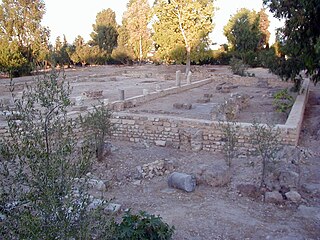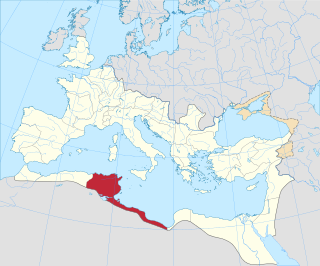Related Research Articles

Pope Miltiades, also known as Melchiades the African, was the bishop of Rome from 311 to his death on 10 or 11 January 314. It was during his pontificate that Emperor Constantine the Great issued the Edict of Milan (313), giving Christianity legal status within the Roman Empire. The pope also received the palace of Empress Fausta where the Lateran Palace, the papal seat and residence of the papal administration, would be built. At the Lateran Council, during the schism with the Church of Carthage, Miltiades condemned the rebaptism of apostatised bishops and priests, a teaching of Donatus Magnus.

Donatism was a Christian sect leading to a schism in the church in the region of the Church of Carthage, from the fourth to the sixth centuries. Donatists argued that Christian clergy must be faultless for their ministry to be effective and their prayers and sacraments to be valid. Donatism had its roots in the long-established Christian community of the Roman province Africa Proconsularis and Mauretania Tingitana, in the persecutions of Christians under Diocletian. Named after the Berber Christian bishop Donatus Magnus, Donatism flourished during the fourth and fifth centuries. Donatism mainly spread among the indigenous Berber population, and Donatists were able to blend Christianity with many of the Berber local customs.
Ex opere operato is a Latin phrase meaning "from the work worked" that, in reference to sacraments, signifies that they derive their efficacy not from the minister or from the recipient, but from the sacrament considered independently of the merits of the minister or the recipient. According to the ex opere operato interpretation of the sacraments, any positive effect comes not from any human worthiness or faith, but from the sacrament as an instrument of God.
Marcellinus of Carthage was a Christian martyr and saint who died in 413. He was secretary of state of the Western Roman Empire under Roman emperor Honorius and a close friend of Augustine of Hippo, as well as a correspondent of Saint Jerome. Saint Augustine dedicated the first books of his landmark The City of God to Marcellinus in 413.

Donatus Magnus, also known as Donatus of Casae Nigrae, was the leader of a schismatic Christian sect known as the Donatists in North Africa, Algeria. He is believed to have died in exile around 355.

Traditor, plural: traditores (Latin), is a term meaning "the one(s) who had handed over" and defined by Merriam-Webster as "one of the Christians giving up to the officers of the law the Scriptures, the sacred vessels, or the names of their brethren during the Roman persecutions". The word traditor comes from the Latin transditio from trans (across) + dare, and is the source of the modern English words traitor and treason. The same root word, with a different context of what is handed to whom, gives the word tradition as well. In the history of the Christian church, it refers to bishops and other Christians who turned over sacred scriptures or betrayed their fellow Christians to the Roman authorities under threat of persecution. During the Diocletianic Persecution between AD 303 and 305, many church leaders had gone as far as turning in Christians to the authorities and "handed over" sacred religious texts to authorities to be burned. Philip Schaff says about them: "In this, as in former persecutions, the number of apostates who preferred the earthly life to the heavenly, was very great. To these was now added also the new class of the traditores, who delivered the holy Scriptures to the heathen authorities, to be burned". Some church members easily forgave the traditors, but the Donatists demanded clear signs of penance. They proclaimed that any sacraments celebrated by priests and bishops who did not perform full penance were invalid.

Optatus, sometimes anglicized as Optate, was Bishop of Milevis, in Numidia, in the fourth century, remembered for his writings against Donatism.
Mensurius was a bishop of Carthage in the early 4th century during the early Christian Church.
Caecilianus, or Caecilian, was archdeacon and then bishop of Carthage in 311 AD. His appointment as Bishop led to the Donatist Controversy of the Late Roman Empire. He was also one of only five Western bishops at the First Council of Nicea.

The Archdiocese of Carthage, also known as the Church of Carthage, was a Latin Catholic diocese established in Carthage, Roman Empire, in the 2nd century. Agrippin was the first named bishop, around 230 AD. The temporal importance of the city of Carthage in the Roman Empire had previously been restored by Julius Caesar and Augustus. When Christianity became firmly established around the Roman province of Africa Proconsulare, Carthage became its natural ecclesiastical seat. Carthage subsequently exercised informal primacy as an archdiocese, being the most important center of Christianity in the whole of Roman Africa, corresponding to most of today's Mediterranean coast and inland of Northern Africa. As such, it enjoyed honorary title of patriarch as well as primate of Africa: Pope Leo I confirmed the primacy of the bishop of Carthage in 446: "Indeed, after the Roman Bishop, the leading Bishop and metropolitan for all Africa is the Bishop of Carthage."
Secundus of Tigisis was an early church leader and primate of Numidia. He was a leading organiser of the early Donatist movement in Carthage.

Majorinus was the leader of a schismatic Christian sect in Roman North Africa known as the Donatists.

Purpurius was a Donatist bishop from 305 to 320 AD, who was instrumental in establishing the Donatist movement of Roman North Africa.

Volitanus also known as Voli and Bolitana was a Roman era civitas (town) of Africa Proconsularis, a suffragan metropolis of Carthage in Roman North Africa.

Abthugni was an ancient city in Roman North Africa at present day Suwar (Henchir-es-Souar) in Tunisia. It was, in Roman times, in the province of Africa Proconsularis, Africa, and latter in Byzacena. In late antiquity Abthugni was also the seat of a bishop, and the diocese is a titular see of the Roman Catholic Church to this day.

Gaguari is a former diocese of North Africa and since 1933 a titular bishopric. The location of the former diocese is for the moment unknown. Under Roman hegemony, the bishop belonged to the province of Byzacène. This province was located in North Africa. The exact location of Gaguari can not be determined for the current state of research. However, everything leads us to believe that the bishopric site localizes to the current Sahel of Tunisia.
Parmenian was a North African Donatist bishop, the successor of Donatus in the Donatist bishopric of Carthage. He wrote several works defending the rigorist views of the Donatists and is recognized as "the most famous Donatist writer of his day", but none of his writings have survived.

Petilianus was an eminent Donatist of the 5th century Roman North Africa, who is known to history through the letters he wrote to the Catholic Bishop Augustine of Hippo and discourses in Augustine's replies. Although most of what we know of him comes from Augustine, his main theology seems to have been "that the true church was only composed of those who were repentant."
The First Council of Cirta was a synod of bishops called by Secundus of Tigisis, the primate of Numidia in AD 303 or 305. It took place in the city of Cirta.

Marculus of Thamugadi or simply Marculus was a prominent bishop and Christian martyr venerated by the 4th-century North African Donatist Church.
References
- ↑ Augustine. Brevie. Coll. iii. 14, 26; 16, 29.
- ↑ Felix of Thibiuca at mappingthemartyrs.org.
- ↑ Éric Rebillard, Christians and Their Many Identities in Late Antiquity, North Africa, 200–450 CE (Cornell University Press, 2012)p59.
- ↑ Serge Lancel, Saint Augustine (Hymns Ancient and Modern Ltd, 2002)[v p166].
- ↑ BonnerGerald, "God's Decree and Man's Destiny: Studies in the Thought of Augustine of Hippo". Church History Volume 57, Issue 4 December 1988, pp. 524-525.
- ↑ Episcopi Aptungitani, of Aptunga.
- ↑ Augustine. Post. Coll. 38:56
- ↑ Augustine, Epistle 43:3-14; 88; c. Cresc. iii. 61
- ↑ J. Patout Burns, Robin M. Jensen, Christianity in Roman Africa: The Development of Its Practices and Beliefs (Wm. B. Eerdmans Publishing, 2014) p394.
- ↑ Saint Optatus (Bishop of Mileve), Mark J. Edwards, OPTATUS (Liverpool University Press, 1997) pxx.